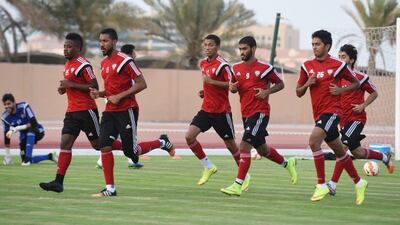Mahdi Ali does not like uncertainty. The UAE coach’s preparations often border on the obsessive; every detail is meticulously covered by his technical team, with nothing left to chance.
On Tuesday night against Palestine at the Faisal Al Husseini International Stadium in Al Ram, West Bank, he will take uncertain steps. A rapidly-improving, dynamic opponent he has never faced before; an artificial pitch; and a passionate, partisan home crowd.
The UAE will experience a 21,000-strong crowd and an atmosphere they have likely never faced against an Arab team.
For the hosts, this joint 2018 World Cup and 2019 Asian Cup qualifier represents the first time they have hosted a match of this stature at the stadium, and against one of the continent’s best teams no less.
PREVIEW: UAE v Palestine, 2018 World Cup qualifier: History will not distract Mahdi Ali's side
Abdel Nasser Barakat, the Palestine manager, hopes the support lifts his team, but his UAE counterpart has a stock answer on the matter.
Before the 2015 Asian Cup semi-final against hosts Australia in January, he reminded those questioning how his team would deal with a partisan home crowd that this group of players had experienced playing in front of 50,000 fans in North Korea, as well as 90,000 at Wembley Stadium when they took on Great Britain at the 2012 Olympics.
Yet this match promises to be as emotionally charged for the Emiratis as it is for the Palestinians, coming just days after 45 Emirati soldiers lost their lives serving their country in Yemen.
While there is little Mahdi Ali can do to control the atmosphere inside the stadium or any other external matters, it is a different story when it comes to the football.
Before arriving in Ramallah, the squad took part in four training sessions on artificial pitches in Amman, with an emphasis on physical intensity and moving the ball forward with speed on the unfamiliar playing surface.
Tactically, the coach has expressed his respect for opponents who have taken huge strides in the past few years, and he paid their skilful midfielders the ultimate compliment by preparing his team to play a high pressing game to deny them the space to showcase their talents.
A draw away from home for will be no bad result. A loss, unthinkable only a few years ago, would represent a major setback for the UAE. Suddenly there would be three teams vying for two qualifying places. That is not the kind of uncertainty Mahdi Ali needs as he looks ahead to next month’s trip to Saudi Arabia.
Things are further complicated by the fact that while the third-place team in Group A will be eliminated from World Cup qualification, it is still an acceptable outcome for Palestine regarding qualifying for the 2019 Asian Cup, something the UAE do not have to take into consideration as hosts.
PALESTINE PLAYERS TO WATCH
Abdallah Jaber
Age: 22
Club: Ahli Al Khalil
The left-back was one of Palestine’s stand-out players at the 2015 Asian Cup, earning praise for holding his own against Keisuke Honda during a 4-0 loss to Japan. Strong in defence and dangerous in attack, Jaber, who plays for the West Bank Premier League champions, has been one of Palestine’s most impressive performers since his debut more than a year ago.
Sameh Maraaba
Age: 23
Club: Hilal Al Quds
Known for two high-profile detentions by Israeli authorities, the skilful midfielder is considered one of Palestine’s most promising players. He scored twice in the 6-0 win over Malaysia after making his debut as a substitute against Saudi Arabia in June.
Tamer Seyam
Age: 23
Club: Thakafi Tulkarm
Part of the team that won the AFC Challenge Cup to earn a place at the 2015 Asian Cup, Seyam, like Maraaba, scored twice against Malaysia last time out, the first a solo effort after beating three defenders. Having scored 18 times for his club last season, he will hope to continue his hot streak for his country tonight.
Pablo Tamburrini
Age: 25
Club: San Luis de Quillota
The midfielder from Chile plays in that country’s top flight. He made his Palestine debut against Saudi Arabia in June and scored in the 3-2 loss. He has brought a scoring threat from midfield to a team that scored once at the Asian Cup.
FOLLOW US ON TWITTER @NatSportUAE

